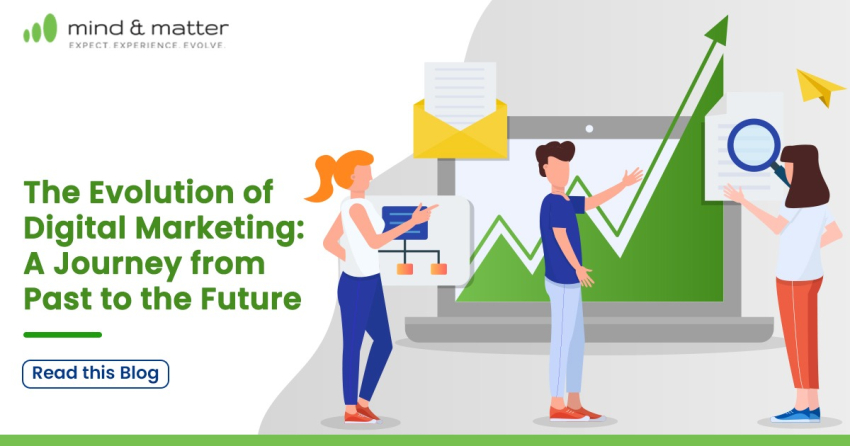Digital marketing’s evolution is a captivating saga of innovation and adaptation, fundamentally reshaping the business-consumer relationship. Let’s embark on a chronological journey through this landscape, highlighting key milestones, technological breakthroughs, and the pivotal role of companies like Mind and Matter.
The Genesis: Pre-2000 Era
The seeds of digital marketing were sown with the birth of the internet in the 1990s. This era witnessed the launch of the first web browser in 1991, marking the internet’s transition from a scientific and governmental network to a commercial and public space. The first clickable banner ad appeared in 1994 on HotWired.com, boasting a click-through rate of a staggering 44% – a figure virtually unheard of today.
The Dot-com Boom: 2000-2005
The dawn of the 21st century saw the dot-com boom, with companies like Amazon and Google emerging as key players. Google introduced AdWords in 2000, revolutionizing digital advertising with its pay-per-click model. Meanwhile, email marketing grew in popularity, thanks to its cost-effectiveness and broad reach, although it was often plagued by spam issues.
Social Media and SEO: 2006-2010
This period marked the dominance of social media and search engine optimization (SEO). Facebook opened to the public in 2006, followed by Twitter’s exponential growth. These platforms became vital for digital marketers to engage with broader audiences. Google’s algorithm updates, like Panda (2011) and Penguin (2012), refined SEO practices, penalizing poor-quality content and unethical link-building strategies.
Mind and Matter, a digital marketing agency, began making significant progress during this era, offering innovative solutions in SEO and social media marketing.
The Mobile Revolution: 2011-2015
The expansion of smartphones and tablets sparked the mobile marketing era. With the introduction of the iPhone in 2007 and the Android operating system, the focus of digital marketing shifted towards optimizing for mobile users. Responsive web design became crucial, and mobile apps emerged as a key marketing tool. Companies like Uber and Airbnb (Vacation rental platform) leveraged app-based platforms to disrupt traditional industries.
Content is King: 2016-2020
As we approached the late 2010s, content marketing took center stage. Businesses invested heavily in creating high-quality, engaging content. Video content, in particular, saw a significant increase with platforms like YouTube and the advent of live streaming on social media. Influencer marketing also became a significant trend, with influencers on platforms like Instagram and TikTok shaping consumer behavior.
During this time, Mind and Matter distinguished itself by providing comprehensive content marketing strategies, helping brands to effectively communicate their narratives and engage with their target audiences.
The Era of Personalization and AI: 2021-Present
Artificial Intelligence (AI) and personalization are defining the current landscape of digital marketing. Companies are using AI to analyze data and provide personalized experiences to users. Chatbots, voice search optimization, and AI-driven analytics are becoming commonplace.
Mind and Matter, along with tech giants like Google and Facebook, are at the forefront of integrating AI into their marketing services, offering more targeted and efficient marketing solutions.
The Future: Integration and Immersion
Looking ahead, digital marketing is moving towards more integrated and immersive experiences. Augmented Reality (AR) and Virtual Reality (VR) are beginning to play a role in marketing, providing unique and engaging ways to interact with consumers. The rollout of 5G technology is expected to enhance these experiences, offering faster and more reliable internet access.
Conclusion
The evolution of digital marketing is a testament to how technology has revolutionized the way businesses connect with consumers. From the early days of email marketing and banner ads to the sophisticated AI-driven strategies of today, companies like Mind and Matter have continuously adapted to these changes, leading the way in innovation. As we look to the future, digital marketing is poised to become even more personalized, integrated, and immersive, reflecting an ever-changing landscape of technology and consumer preferences.

Suman Shaw
Hello, I'm Suman Shaw, currently fortunate enough to be a part of the team at Mind and Matter. Thank you for tuning in to explore more intellectually stimulating content. Don't forget to follow for more enlightening discussions and content.



